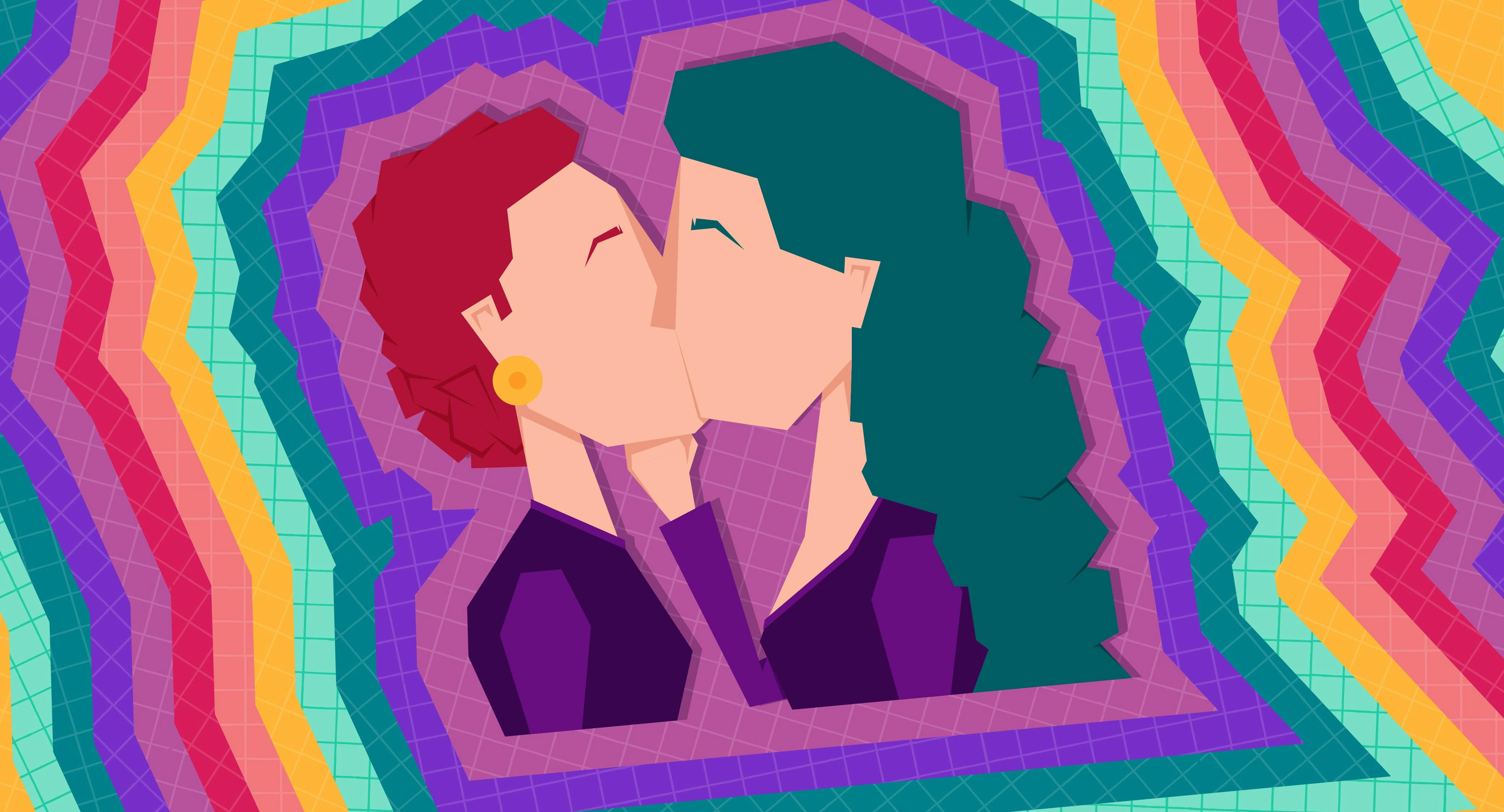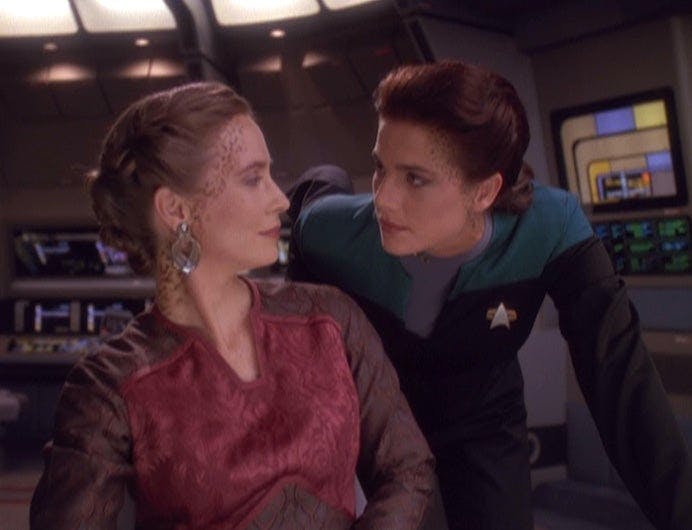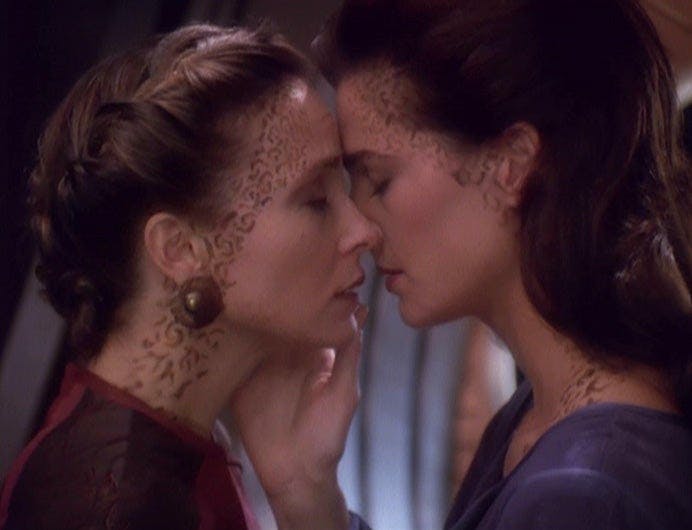Published Jun 10, 2021
How DS9's Rejoined Gives Us Hope For the Future
Jadzia Dax and her chosen family are a beacon of hope in the face of queer hostility.

StarTrek.com
“I don’t understand how two people who are in and love and who’ve made a life together can be forced to walk away from each each other because of a taboo.” - Kira Nerys, Star Trek: Deep Space Nine, “Rejoined”.
I was only five when Star Trek: Deep Space Nine first aired, and coming to it later has been an enormous source of joy, amusement and hope, as the ideas of a distant future from the 1990s blur with the reality of life in the 2020s. Nowhere has this spoken to me more deeply than in "Rejoined."
The episode sees a Trill delegation board the station on a research mission, reuniting Dax and her symbiont’s ex-wife, Lenara Kahn. The complexities of living through various hosts of many genders creates an allegory which offers a small slice of hope for bi and genderfluid inclusion and acceptance. The episode balances this allegory on a knife edge, with a scathing commentary on the costs of taboos and the price of living your truth; and, in particular, the parallels with the current cultural climate of trans-hostile rhetoric and bi-erasure.
Something that struck me deeply is the care and compassion Jadzia’s friends and colleagues show for her, as they try to gain an understanding of the way that her current and past identities and relationships impact her. As a bi person in a society which is quick to define us all by our most recent relationship, this commitment to understanding was heart-warming. Even Quark, desperately wanting to understand the exact logistics of everything, is a welcome wry insight into the bar conversations every queer person has come up against at least once, with that one guy who is just desperate to know all the details of things which have literally no bearing on his life.

StarTrek.com
Quark’s morbid fascination with Jadzia’s love life is problematic, but then, Quark himself can be problematic. His desire to know more reflects the swathes of society who don’t understand and contribute to harm without engaging in ‘obviously’ hateful behaviors and actions. Meanwhile, Bashir, Sisko, and Major Kira actively engage in allyship to varying extents, offering hope that both 25 years ago, and 400 years from now, the vast majority of society will support queer lives and queer loves. Kira's short lived confusion over the situation quickly turns to a desire to see love persevere, while Bashir and Sisko take more pragmatic stances but still actively support Jadzia and Lenara. They are the medical professionals, bosses, and friends we need in this life.
The beauty of the episode, the source of hope which spoke to me against the backdrop of taboos and negativity, comes from the overwhelming sense that Jadzia and Lenara have the support of the writers! The viewer is set up to be in cahoots with Jadzia and Lenara, as they are against the rules and observers who would keep them apart. Their stolen glances and tentative brushes evoke feelings and frisson which will be familiar to so many queer people. Desperately in love with my flatmate at age 19 while the external world told us to calm down and find nice cishet relationships in clubs, it was these very moments which brought us together and affirmed my feelings.
Of course, in an all-too-recognizable slice of realism, Trill culture dictates that a reunion would result in exile, and ultimately death, for Jadzia and Lenara. This echoes reality all too well; the most recent statistics available from the Human Dignity Trust show that there are still 71 jurisdictions which criminalize homosexuality, and in 11 of these jurisdictions homosexuality is punishable by death. Meanwhile, there are 15 jurisdictions which criminalise the lives and gender identities of transgender people. These examples are not extreme outliers and are very real examples of the way that taboos and cultural attitudes — like those shown in our Trill allegory — cost lives.

StarTrek.com
The juxtaposition in responses from the ridgid Trill delegation, in contrast to the gentle, affirming openness of Sisko is a story reminiscent of the experiences so many of our communities find themselves in, leaving homelands and biological families, creating chosen families, and accepting negative social and structural consequences by living openly and authentically.
As a bi person working in the LGBT+ sector and seeing the daily attacks on trans and non-binary communities, I hope that we achieve a world where we are all free to love and live as we please before the 24th Century. But in the face of our early 21st-century challenges, an alien space kiss from 1995 brings a strange comfort, reminding us that we have always existed, we always will, and there will always be people on our side.
Helen Bowie (she/her) is a poet, performer and writer, currently working on a series of short stories about the exposition women in bad films, and attempting to train for a half marathon after 15 months of lounging around eating pastries in pyjamas. Helen over-relates to every single bi character ever, and is not at all embarrassed to admit it. Follow her on twitter @helensulis
